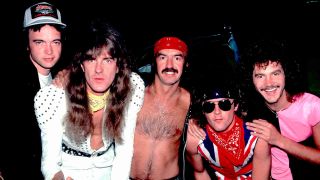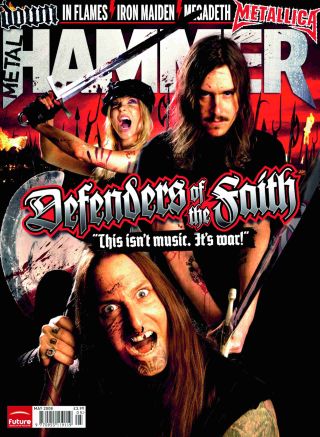Because of traditional albums corresponding to Wheels Of Metal and Robust Arm Of The Regulation, Saxon had been NWOBHM trailblazers. However by the point of 1984’s divisive Crusader, issues had been trying much less regular. In 2008, frontman Biff Byford seemed again on an album that deserves extra love than it will get.
“We had been trendsetters again then,” laughs Saxon singer Biff Byford. “Right this moment everyone from attire like knights going to the crusades, and writes lyrics about it. However again then it was just about exceptional for a steel band to do something like that. And what did we get for being modern? Yep, we obtained slaughtered by everybody. That’s what you face for making an attempt one thing new. Nonetheless, at the least we are able to flip to all of these folks now and say, ‘Properly, who was proper?’”
When the Yorkshiremen launched their sixth studio album, Crusader, in 1984, they had been a serious drive in steel. Beginning out as Son Of A Bitch in 1974, they grew to become Saxon 5 years later, the identical 12 months they signed to French label Carrere and launched their self-titled debut, the primary album put out by any New Wave Of British Heavy Metallic band.
But it surely was 1980 that propelled them to fame. Biff, guitarists Graham Oliver and Paul Quinn, bassist Steve Dawson and drummer Pete Gill issued the Wheels Of Metal and Robust Arm Of The Regulation data, each of which had been massively profitable. They continued to unfold the phrase with 1981’s Denim & Leather-based, though Gill left the next 12 months – he later joined Motörhead – and Nigel Glockler got here on the scene.
The brand new-look Saxon launched the dwell album The Eagle Has Landed in 1982, earlier than heading out to Atlanta, Georgia to document 1983’s Energy & The Glory. Having already made their mark again residence, they had been making strides within the US, the place they’d lately toured with Iron Maiden and Mötley Crüe. They began writing Crusader in Doncaster, a couple of miles down the street from their native Barnsley. However when it got here to recording it, they determined to return to the US – particularly Sound Metropolis Studios in LA with producer Kevin Beamish.
“We by no means obtained too concerned in selecting producers,” admits Biff. “Maybe we must always have, as some unhealthy choices had been made. More often than not the label would provide you with a reputation and we’d go together with it. The idea appeared to be that we wrote and recorded the songs and that was our contribution. American producers understood melodies and industrial tunes however weren’t capable of come to phrases with typical British energy and aggression.”

Kevin flew to England to fulfill Saxon through the writing periods. “He helped us to jot down Do It All For You, because the label needed a ballad. That was his solely contribution to any of the songs,” says Biff.
Decamping to Los Angeles to document the album, the band had been joyful to combine enterprise with pleasure.

“We had a good time in America,” laughs Biff. “We had been there for about eight weeks and all had flats by Common Metropolis; there have been events with our girlfriends. And groupies. The solar shone on a regular basis. If you happen to’re a star in LA then life’s good, and the band had been well-known due to all of the touring we’d executed. We used to hang around loads on the Rainbow Bar & Grill on Sundown Strip, the place all of the rockers find yourself. You’d all the time stumble upon some band or one other who had been passing by way of, just like the Scorpions or Bon Jovi.”
Whereas the songs lacked the uncooked punch of their NWOBHM-era classics, they nonetheless had their moments. The centrepiece was the title monitor; a sprawling historic epic that’s taken on a lifetime of its personal over time.
“I’d all the time had an actual curiosity in historical past, particularly the Crusades,” explains the frontman. “However this was the primary time I’d managed to jot down a tune about that period. I did it from the perspective of a younger lad watching because the knights go off to battle and wishing he may be part of them. The primary piece of the tune might be about any warfare in any a part of the world. However then the lyrics obtained very particular.”
Twenty years later, these phrases would trigger Saxon a serious downside. They had been attributable to play on the Dubai Desert Rock Competition in 2006, however had been then pulled from the invoice when an area newspaper revealed the lyrics for Crusader. The road ‘The Saracan heathen will style our metal’ didn’t go down in any respect properly with the authorities within the United Arab Emirates. In consequence, the Division of Tourism And Commerce Advertising and marketing refused permission for the band to play.

“I feel that tune’s been misunderstood over time. Additionally, as a result of it was the title monitor of the album, folks thought we’d executed an idea document, which wasn’t true in any respect. Thoughts you, we did use the Crusader imagery in all places. We will need to have executed tons of of photograph periods dressed up as knights of the interval. A few of them did look a bit ridiculous.”
Maybe the 2 most contentious songs on the document had been Crusing To America and Set Me Free. The previous was seen by many as Saxon buttering as much as America by praising it as their religious residence. Not so, insists Biff.
“It was in regards to the Pilgrim Fathers discovering a brand new residence. Possibly I ought to have made it extra apparent by calling it Pilgrim Fathers. Apart from, we’d been to America a great deal of instances by then on tour. So why on Earth would we wish to do a tune about how we longed to go there?”
Equally divisive was Set Me Free, a canopy of an outdated tune by 70s glam rockers Candy. “Considered one of our guitarists prompt we do it,” says Biff. “It was the primary time we’d executed a canopy. It turned out alright, nevertheless it may have been so a lot better. Our massive mistake was in making an attempt to do it the identical as the unique – we must always have been seeking to do it within the Saxon model. Additionally, the vocals had been exterior my vary on the time – too excessive pitched. But it surely turned out OK.”
Crusader was launched in January 1984. It featured a placing cowl by artist and future Bloodstock founder Paul Gregory, that includes a knight en path to the Crusades.
“That was such a traditional portray,” says Biff. “It was so heavy steel. We had been in a position to make use of elements of it on t-shirts and the tour programme. It represented what we had been making an attempt to get throughout on the document.”
However critiques for the album had been combined – some claimed that Saxon had misplaced greater than they gained by recording within the US. Within the UK it peaked at No.18, their lowest place because the debut, whereas within the US the document solely made it to No.174. Neither Crusing To America or Do It All For You had been hits after they had been launched as single – the previous limped to No.81, whereas the latter didn’t even make the High 100. Biff has an uncommon idea as to the disappointing essential and industrial reception.
“I feel folks liked us an excessive amount of,” he explains. “They felt loads nearer to Saxon than most different bands. So once we made what had been thought of to be awful choices they’d criticise us greater than anybody else. We had been most likely victims of our reputation. But regardless of this, Crusader is our biggest-selling album.”
The following tour actually was a large affair, with the band utilizing a stage set primarily based across the album, together with citadel battlements and a faux stone ground.
“The ground was manufactured from lino and seemed nice, however the dry ice made it very slippery. All of us fell over three or 4 instances through the present. Loopy! After three gigs, we removed it.”
Regardless of these teething issues the tour was a hit, although Crusader itself didn’t kick Saxon’s profession to the following degree in the way in which they hoped. It was additionally their final album for longtime label Carrere, with the band switching to EMI for 1985’s Innocence Is No Excuse. However trying again, Biff considers the document deserves the respect it was denied on the time.
“It’s an excellent album, one which turned out higher than I believed again then,” he says. “And its success down the years has actually confirmed we did the correct factor. All those that had a pop at us for Crusader had been flawed.”
Initially revealed in Metallic Hammer situation 178, April 2008

